Many kids pay close attention to the IELTS paper and pencil exam. Recently, the IELTS paper and pencil exam will be officially opened from July to December 2023. Today, the editor for studying abroad will introduce the relevant content of the IELTS paper and pencil exam from July to December 2023. If you are interested in this topic, please click the website of studying abroad.
Official announcement! From July to December 2023, the IELTS paper and pen exam will be open: five high-energy broadcasts! Organize the exam calendar!
Five high-powered announcements of IELTS paper and pen exam positions from July to December 2023
1. From July to December 2023, the IELTS paper and pencil examinations and IELTS life skills paper and pencil examinations have officially opened for registration!
2. In the second half of 2023, a total of 22 test dates will be open, including 4 new test dates for Chinese candidates. Candidates have more choices and more seats!
3. There are more test sites on each test date than ever before!
4. From April 1, 2023, the deadline for registering for the IELTS paper and pencil test will be shortened from the current 16 days before the test to 12 days before the test. Candidates can sign up more leisurely and have a shorter waiting period.
5. Please pay attention to the registration of the IELTS computer test from July to September 2023, which will be open in late March.
July to December 2023 in Mainland China
IELTS test date calendar
IELTS Paper and Pen Test Date
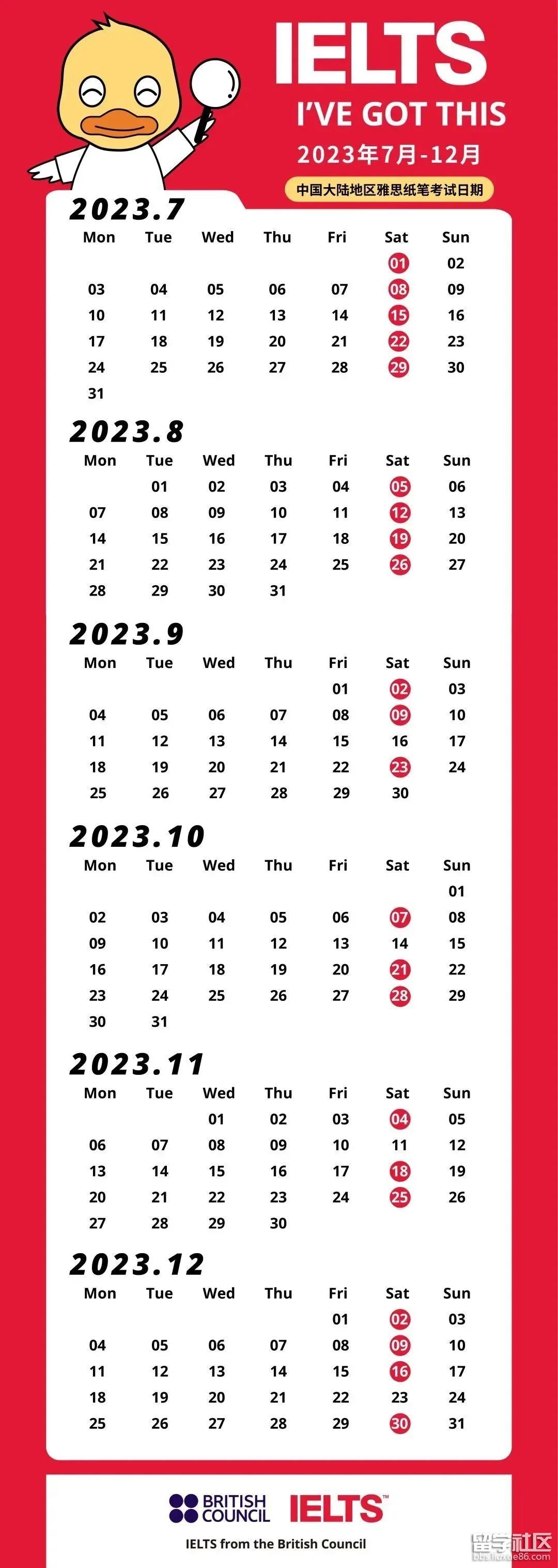
IELTS Life Skills Exam Date
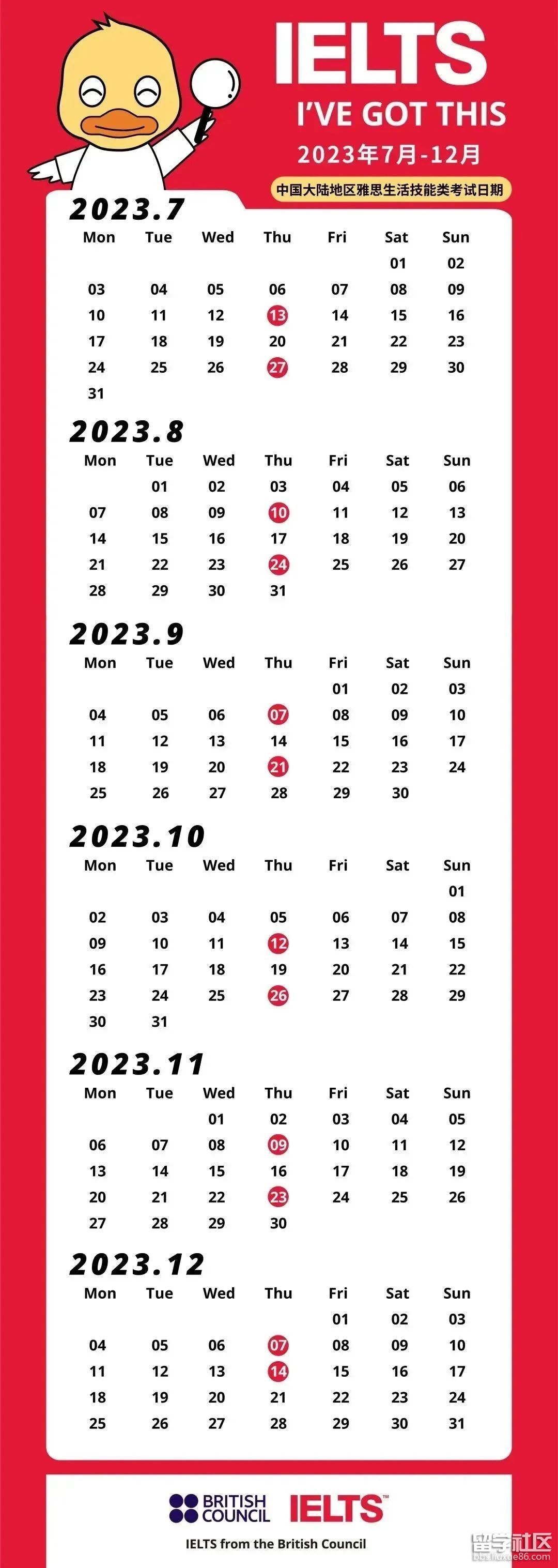
July December 2023
[Ordinary IELTS and IELTS paper and pencil test for UK visa and immigration]
Registration deadline and printing date of admission card
And the date the transcript was sent
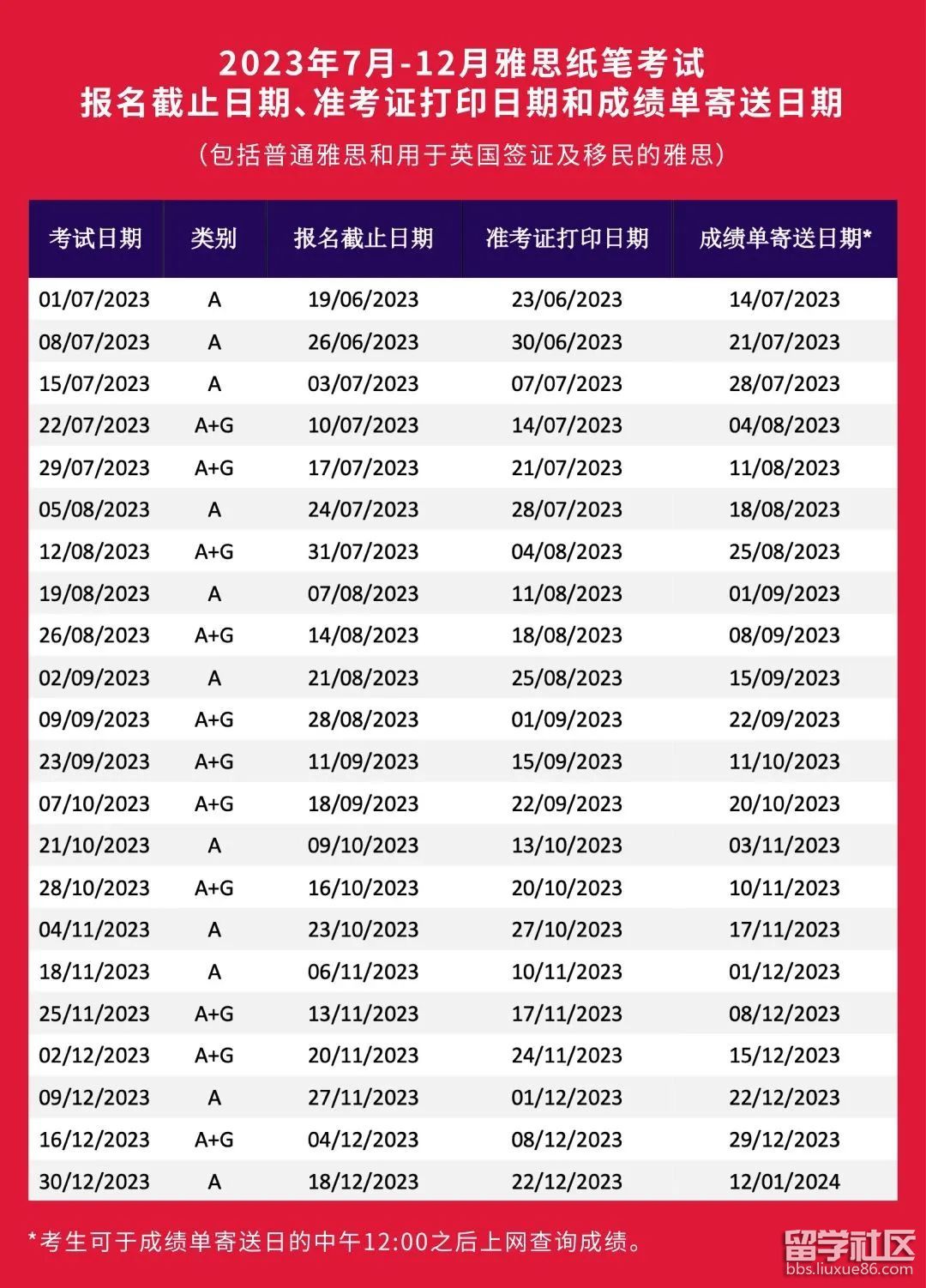
July December 2023
[IELTS Life Skills Test]
Registration deadline and printing date of admission card
And the date the transcript was sent
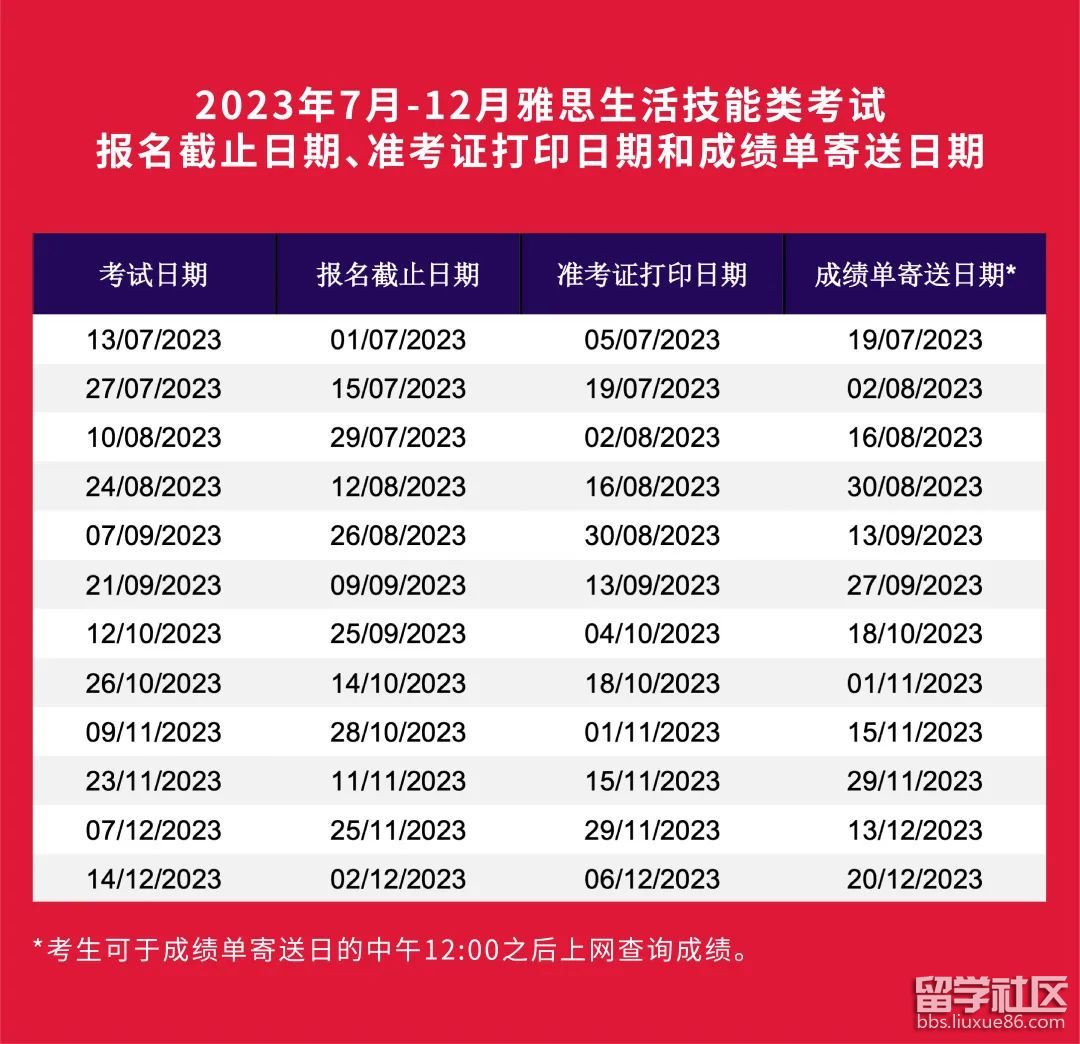
*If you want to inquire more details or register for the test, please log on the IELTS registration website Click to enter 。
IELTS self-taught preparation strategy, regardless of losses, dry goods are full!
IELTS question type
For Xiaobai, who is just starting to learn IELTS, the first thing to know is what the four subjects of IELTS are: listening, speaking, reading and writing? What types of questions are there in each part? What is the specific investigation? Join us today to let you know all the IELTS test procedures in 5 minutes.
IELTS is divided into Academic (Category A) and General Training (Category G). Category A is the academic IELTS that we are more familiar with. The IELTS scores required for undergraduate and graduate students are Category A IELTS; Class G is the training IELTS, which is generally used for foreign secondary school course application, job application, planned immigration, etc 。 Most of the examinees are prepared for the A-type IELTS test. The following is mainly about the content and preparation plan of the A-type IELTS test.
One to understand the scores and test contents of the four IELTS subjects
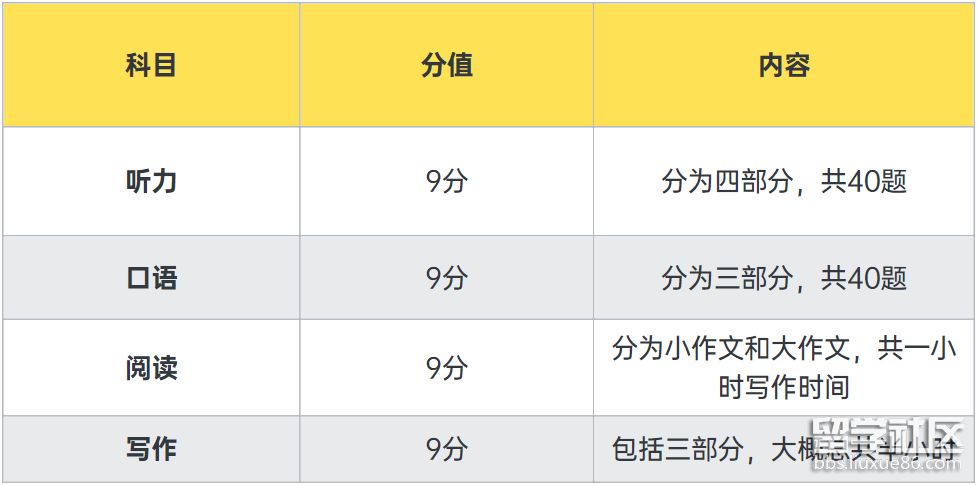
hearing
Since 2020, IELTS has made major adjustments in the listening test, canceling the example part of the sample test, and entering the Part 1 test directly after the instruction.
IELTS listening is divided into four parts, 40 questions, and the total length of the exam is 40 minutes. 30 minutes is for listening to the recording and doing questions, and the last 10 minutes is for filling in the answer sheet. During the formal exam, students should not rush to fill in the answer card. It is the best policy to calm down and do a good job.
Listening questions include multiple-choice questions (single choice, multiple choice), blank filling questions, completion table questions, matching questions, and map and graph questions. You can practice more according to your weak points. (In addition, although most of the standard English pronunciation is used in the IELTS listening test, the standard pronunciation with American accent and Australian accent will occasionally appear.)
The purpose of IELTS listening test is to examine students' listening skills in academic, working and living environments. For example, in an academic environment, students need to have group discussions with classmates in class and academic exchanges with supervisors. The IELTS listening test is designed according to these scenarios.
The following are the test types and investigation contents of the four parts of listening
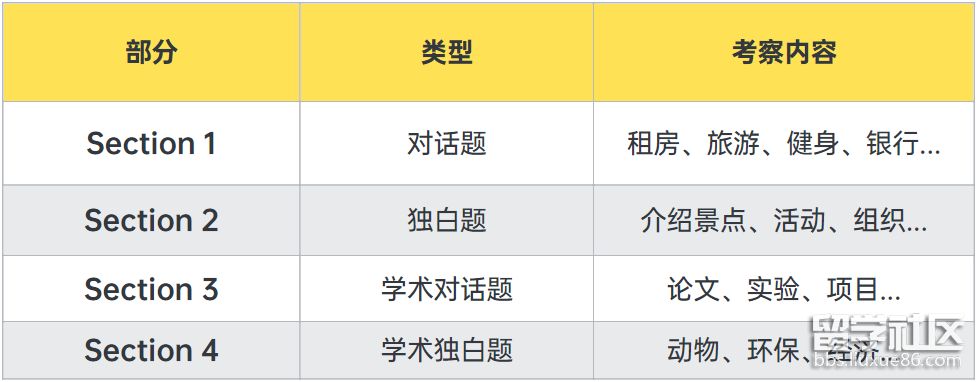
Please note that the recording is only played once.
Accent problems in audio
It should be noted that the purpose of the IELTS listening test is to examine students' listening ability in a real English environment. Since it is true, it cannot avoid the accent problems of English speakers around the world.
In general, the IELTS listening test covers three major regional English accents: North America, Britain and Australia. The best way to become familiar with these accents in preparing for the exam is to listen to English listening programs in the real world, such as English news, podcasts, TV dramas, movies, talk shows, etc.
read
There are three articles in IELTS reading, each of which has about 800-1200 words and 40 questions, with a total length of 60 minutes. Generally speaking, it is recommended that the reading time of each article be controlled at about 20 minutes, but students can adjust it appropriately according to different situations of each person.
In limited time, reading word by word may affect the efficiency of answering questions. So the main purpose of the reading test is to investigate students' reading skills, how to quickly and effectively digest a large number of academic materials, and obtain information. When reading, you need to master the methods of skimming and scanning.
For example, can you answer the question about percentage from the following paragraphs?
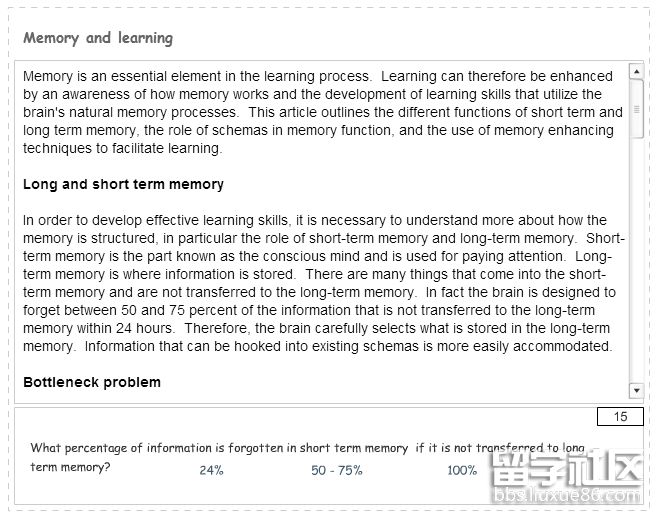
It's easy to find it, right! Because the question contains the word percentage (i.e. keyword clue), you only need to find the information about the percentage mentioned in the article, and then select the answer after comparison.
The IELTS reading questions are mainly divided into these seven categories.
1) Fill in the blanks
2) Multiple choice questions (usually in order)
3) True, False, Not given)
4) Which paragraph contains the following information
When encountering information problems, you should arrange and adjust your time a little differently.
5) Match each statement with the correct person/date etc
6) Choose the correct heading for each paragraph
7) Flowchart, chart title
There are different reading methods and answering skills for different types of questions, but skills are ultimately the aid of reading. Please remember that there are more complex challenges waiting for you in the real exam, and you need to deal with them one by one according to the situation.
In addition, we must carefully analyze the wrong questions and guess the right questions, and find out the reasons for the mistakes. Only after the confusion is solved can we improve our reading ability.
Develop the habit of reading English
In addition to answering skills and memorizing words, an indispensable part of improving reading scores is to read a lot of English materials. The more you read, the better your reading ability will be.
oral language
Oral IELTS mainly focuses on topics and is divided into three parts.
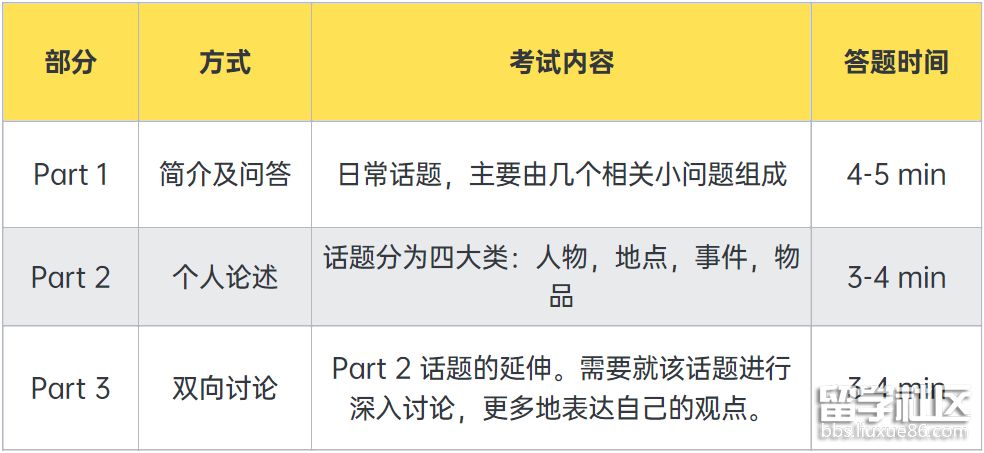
The examination time usually ranges from 10 minutes to 14 minutes. The oral part mainly examines whether candidates can carry out basic daily dialogues, express their views and discuss academic issues.
writing
IELTS writing consists of two tasks. Task 1 short composition (150 words) and Task 2 big composition (250 words) take 60 minutes in total.
In addition to writing ability, writing also examines candidates' time management and planning ability. In addition to completing the writing content in the whole 60 minutes, it is also recommended to include brainstorming (mind map), spelling and grammar check and other issues.
According to the official requirements - the short composition needs to be written 150-200 words within 20 minutes, and the score accounts for one third of the total score of writing. This part mainly describes the information content on the chart, without expressing your own views. It mainly focuses on the examinee's ability to describe and analyze data.
The question types of Task 1 essay are roughly divided into the following categories:
Line graph
Bar chart
Pie chart
TableTable
Flowchart Diagram
Map
Mixed chart

At first glance, the small composition looks very academic, and needs to objectively describe the known information in English. But in fact, there are certain routines and mysteries in it for different question types. For example, the logic of vocabulary and sentence patterns can be accumulated through test preparation. When the examinees are familiar with these rules, they can quickly answer the questions and leave more time for the big composition.
In general, it is necessary to write at least 250 words in 40 minutes for a big composition, which accounts for two-thirds of the writing score.
The following are some common questions in the composition:
Discussions both sides and give your own opinion
To what extent do you agree or disagree
Advantages and disadvantages
Analysis+suggestions solutions
What the big composition examines is Candidates are required to be able to use appropriate tone and register (including vocabulary, grammar, etc.) to discuss problems and demonstrate. However, it should be noted that if the difference between the scores of two compositions is greater than 1 point, 0.5 point will be automatically deducted from the total score after weighting 。
When preparing for the big composition, it is not only necessary to accumulate relevant vocabulary sentence patterns, supplement grammar knowledge, reading materials, etc., but also need to update and improve the examinee's logical thinking, especially critical thinking ability. This is the weakness of Chinese examinees, but it can be improved through systematic thinking training.
Preparation time
How long does it take to prepare for the IELTS test? Students who slaughter ducks for the first time will have such questions. Today we will solve this problem for you.
Normally speaking, from class to practice to attack the weak items, the basic preparation time is usually three months. However, some students with poor foundation, such as those who have not passed CET-4, need to reserve more time for preparation. The detailed time is determined according to the students' current English level.
Therefore, before officially entering IELTS study, English proficiency assessment is an important link that cannot be ignored. The evaluation method can choose to do a set of official authentic Cambridge IELTS questions with moderate difficulty, answer the questions according to the strict examination time and process, and then calculate the scores and estimate according to the reference answers after completion. (Never use the various and uneven quality model test questions on the market, which are not very referential)
Refer to the following
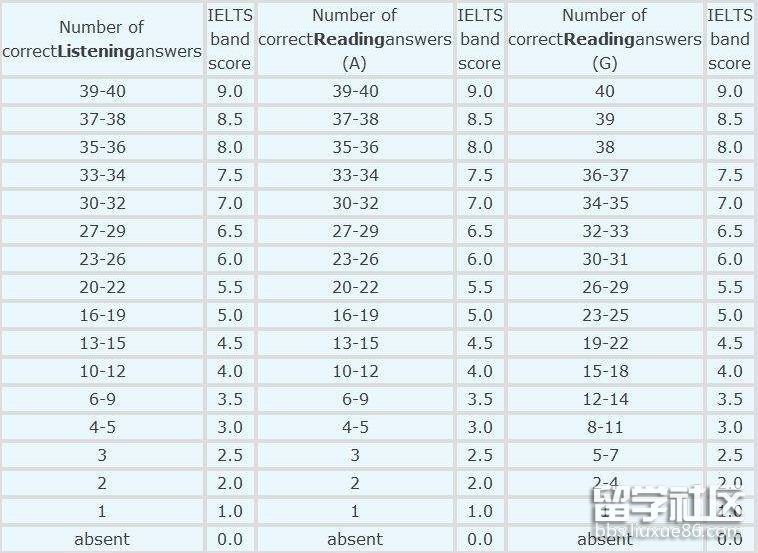
Speaking and writing are subjective questions, and the scoring is largely determined by the examiner's subjective feelings. Moreover, the official scoring standards are relatively broad, and it is difficult to find out the ways. Therefore, it is recommended to find a person or teacher with a high level of English for evaluation.
Through the simulation test, students can not only understand the form of the IELTS test, but also know the gap between their current level and the target score, so that they can better develop their own IELTS learning plans and more targeted impact on the target score.
In general, Before the systematic training, the students whose English level is about 120 in the college entrance examination have about 5 IELTS scores; The total score of CET-4 is 500-600, and the IELTS score is 5-6; College Level 6: 500-600, IELTS: 5.5-6.5.
Less than 6 points
For students whose scores are below 6 in the self test, it is urgent to improve their English ability and consolidate their English foundation. In this case, it is suggested that the preparation period should be longer, about half a year, and at least three hours of review time should be guaranteed every day.
6-7 points
Students who scored 6-7 in the self-test, which means your English foundation is OK. Through a period of IELTS test taking skills learning, real question simulation training, long and difficult sentence practice, you can sprint to 7 or even 7.5 points. In this case, it is recommended that the examinees spend more than two hours every day reviewing, and the preparation time should be stable around three to four months.
More than 7 points
Those who have scored more than 7 points in the self-test, congratulations on your English level. However, they should also be careful. It is recommended to spend more than two hours every day, and the overall preparation time should be about two to three months.
For beginners with medium and weak English proficiency, it is recommended to prepare for the exam within 3-6 months. In the early stage, lay the foundation first, accumulate vocabulary and learn grammar, and at the same time, give yourself enough time every day to listen to English, (read) read English, sentence building training, etc; In the later stage, different types of questions will be trained; In the sprint stage, do several complete sets of authentic Cambridge IELTS questions.
Test preparation materials
IELTS Listening
The key point of IELTS listening test is to solve words and identify sounds. The recommended textbook is Wang Lu, IELTS, Wang Listening

1. There are 11 chapters in this book. The most important chapters are chapters 3, 4, 5 and 11. Students with insufficient time can only study these chapters
2. In front of us, we should first learn the three chapters 3, 4 and 5, and then do the final 11 chapter test questions under the condition that the accuracy can be guaranteed.
3. You must pay attention to vocabulary and pronunciation. As long as you are proficient in this part, the score of the IELTS blank filling part will be guaranteed. Therefore, it is recommended that the accuracy of the words in each chapter should be more than 90%, and you should review every high-frequency vocabulary.
4. As for the listening multiple-choice questions, please refer to the previous video "IELTS Learning Advanced", which has a detailed method introduction.
IELTS reading
1. The first thing to solve in IELTS reading is still the vocabulary. It is suggested that students with ordinary foundation can start from the vocabulary of CET-4 and CET-6 and then the high-frequency words of IELTS. You should also pay attention to the accumulation of new words when you meet them in the process of doing exercises!!
2. In terms of word memory, it is suggested to combine word software with books, which will be more profound. Generally, you can choose the electronic version of the software and the paper version - the same word book to remember. The word software is much the same. I have recommended Mo Mo reciting words, music words, etc. in previous videos. You can choose the one that suits you.
3. In terms of problem solving, we must do it in a limited time, and be more strict than in the exam. Don't deceive yourself. I have contacted many students who usually have good accuracy in problem solving, but the real test scores are not good, because they didn't finish the problem within the limited time.
4. In addition to brushing the questions, it is not enough to do the reading. It is also necessary to do the reference materials for intensive reading, recommend the "9-point talent IELTS reading" and the textbook "Is not IELTS reading" compiled by Teacher Dili himself
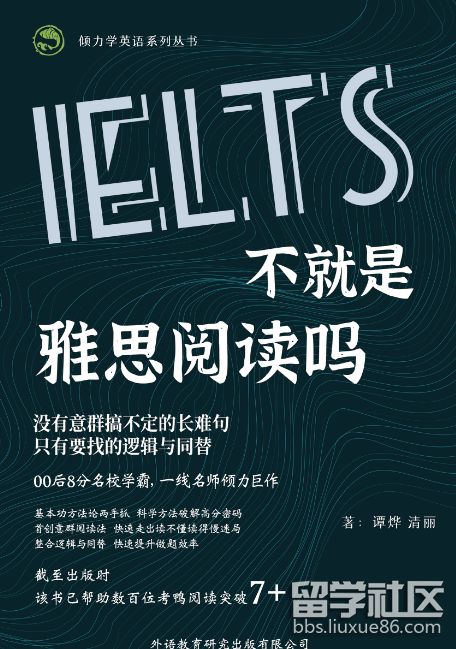
5. If you want to quickly understand the general idea of the article, you need to understand the grammar, long difficult sentences, etc.
IELTS Writing
1. The main problem to be solved in IELTS writing is the diversification of expression, that is, vocabulary, phrases and sentences!!
The recommended reference books are Gu Jiabei's Hands on IELTS Writing and Shen Xiaoyi's Ten Days of Breaking through IELTS Writing. Students who can spare no effort can add a copy of Native Speaker's Pure British Phrases&1000 British Sentence Patterns, but if they can make good use of the previous two books, they can basically achieve good results.
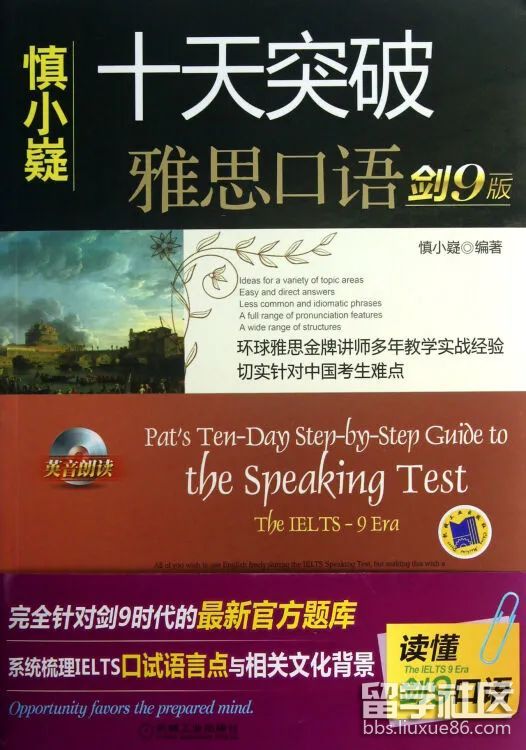
2. As for writing, first of all, we should accumulate enough common words and expressions for classification. Here we can directly remember the words in Gujiabei Book.
While memorizing the words, we should also practice sentences to consolidate vocabulary expression. We also use the sentence translation and comparison of this book to get familiar with topic classification and master the ability to write sentences.
3. The biggest advantage of Gu Jiabei's book is that the content of sentence translation is that the structure, discussion, material, expression and grammar of the full score model 700 of IELTS writing are all written according to the standards of IELTS writing. Therefore, if you practice the sentence translation in the book, you can write an IELTS composition with ease.
4. Xiaoyi's Breaking Through IELTS Writing in Ten Days also has its own advantages. The book explains the scoring standard of IELTS writing very clearly. Before getting high scores, roast ducks should understand the test rules first to get twice the result with half the effort.
In addition, what I use most in this book is the explanation of the small composition in it. Basically, I can get good results by practicing the small composition more according to the writing method given in the book.
Spoken IELTS
1. For the speaking of IELTS, the difficulty of most students is that they have no opinions, no ideas, and simple expression,. For this reason, I still recommend Gu Jiabei's Hand to Hand Teaching You IELTS Words and Shen Xiaoyi's Ten Days of Breakthrough in Oral IELTS
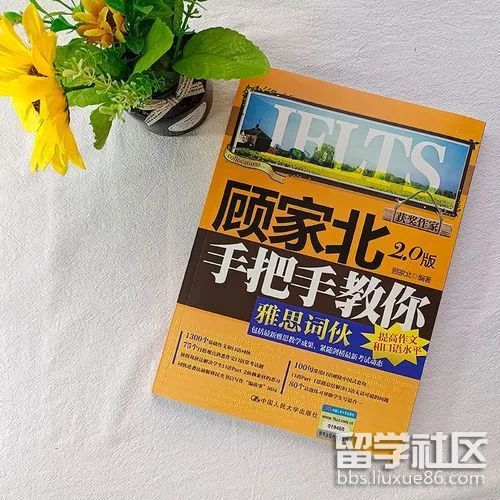
2. Gu Jiabei's book provides classified topic materials and lyrics for IELTS speaking.
When practicing the questions, the first step is to answer them by yourself through the Chinese ideas given in the book. If you don't understand them, you can refer to the word group.
Then you can refer to the English answers given in the book, correct your own answers, and finally accumulate useful vocabulary expressions, and practice the topic.
3. Shen Xiaoyi's book is used to familiarize himself with the scoring standards of the IELTS Speaking Test, know how to answer questions with high scores, and what low-level mistakes will lead to loss of scores. In addition, the little question book also provides many useful oral expressions and alternative expressions 5, which is also obviously helpful for improving the answers!
Recommended reading:
IELTS Study Abroad Policy: Cancel Home Test? The famous school makes a voice, and the IELTS test at home directly sends a rejection letter! IELTS test preparation guide!
Important! The latest news announced by the IELTS Indicator official: Will it be offline in China?
IELTS reform for studying abroad: official announcement! IELTS Pinyin will be launched in mainland China soon! IELTS score suggestions!
The latest arrangement of the IELTS test for studying abroad in 2023: the latest summary of IELTS test places and time from January to June

















